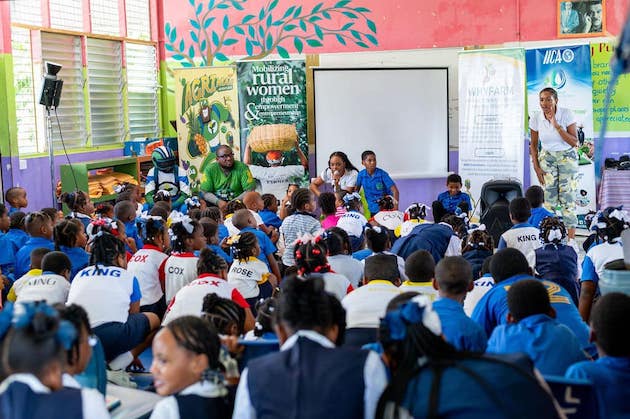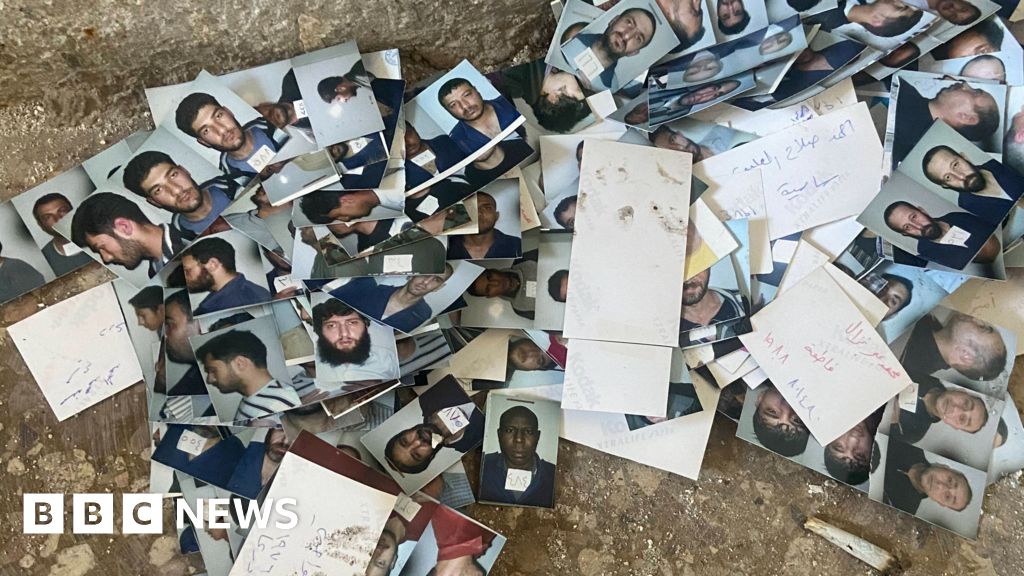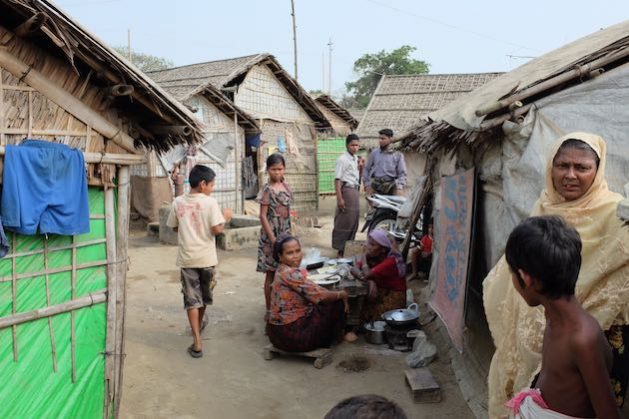Commonwealth Civil Society Offers Ministers Crucial Recommendations for Gender Equality Advancement — Global Issues
SAINT LUCIA, Nov 03 (IPS) – Amid fears that global shocks like the COVID-19 pandemic have eroded progress toward gender equality, the Commonwealth Foundation has created an online platform that takes civil society’s recommendations for the empowerment of women and girls directly to policymakers.On August 22, 2023, Women’s Affairs Ministers from the Commonwealth huddled in a room at the Atlantis Resort in the Bahamas. For the first time since the COVID-19 pandemic, they were meeting in person.
The 13th Commonwealth Women’s Affairs Ministers Meeting was being held under the theme, Equality Towards a Common Future. It was taking place amid the acknowledgement by policymakers that issues like accelerating climate change, economic turmoil, political upheaval in some parts of the world, and the COVID-19 pandemic have taken a debilitating toll on progress toward the empowerment of women and girls.
Bahamian Prime Minister Philip Davis vowed that the gathering would be solutions-oriented.
“The time is now for our Commonwealth community to be unabashedly ambitious in our goals and plans. We need more than slogans – we need commitments,” he said.
As Dr Anne Gallagher, Director General of the Commonwealth Foundation, addressed the high-level forum, images of a recent online civil society gathering organized by the Foundation flashed on screens across the room. The key outcome of that event was a list of ten recommendations that civil society groups from across the Commonwealth want women’s affairs ministers to consider.
Recommendation number seven, “Measure better to target better,” appeared on the screen. It was one of the recommendations that drew animated discussion among delegates. It came from a young woman dedicated to helping women farmers in her part of the world.
The journey of a recommendation from an online forum to the Commonwealth’s highest decision-making body for women’s affairs is serving as an example of the importance of not just giving a voice to those who are on the ground, working with women and girls but ensuring that their concerns are heard by those charged with gender equality policy action.
A Virtual Roundtable
Keithlin Caroo was a panellist on the Commonwealth Foundation’s Critical Conversations series, a virtual discussion that seeks to find sustainable solutions to the most pressing issues for the 2.5 billion citizens of the Commonwealth.
For years, Caroo has been on a mission to help rural women in her home country, Saint Lucia, and has extended that support to the neighboring islands of St. Vincent and the Grenadines and St. Kitts and Nevis. She is the founder and executive director of Helen’s Daughters, a non-profit organization that she refers to as a ‘community,’ which has been changing the narrative on women in agriculture. Helen’s Daughters is built on the premise that while in small states, everyone is connected to agriculture, women are not sufficiently supported despite their pivotal role in the sector.
The organization helps rural women with market access and forges linkages for farmers with supermarkets, restaurants, hotels, and the public through a FarmHers Market. It runs a free Rural Women’s ‘Ag-cademy’ on the islands of Saint Lucia, St. Kitts and Nevis and St. Vincent and the Grenadines, which focuses on sustainable agriculture and entrepreneurship. It is the first all-women agri-apprenticeship programme in the Caribbean. The organization operates a structured care system that focuses on the holistic development of women, hosting training on trauma-informed care to peer-to-peer support and wellness retreats.
Before the virtual event, the Commonwealth Foundation had made it clear – recommendations from the forum would be put before decision-makers. When Caroo spoke, she did so on behalf of the women farmers who toil daily in a sector fraught with gender biases.
“This engagement was important because it shows that the voices of grassroots organizations are important to Commonwealth’s policymaking; however, what’s important for me is seeing to it that the recommendations translate from policy to actions on the ground,” she said in an interview with IPS.
“We recognized the lack of sex-disaggregated early on, and aside from our interventions, data collection, monitoring, and evaluation are key to our work. Lack of data places further burden on us because aside from crafting interventions relevant to our beneficiaries, we are also responsible for primary data collection, which takes more time and resources; however, we must craft interventions according to the current state of play rather than what is imagined. As I said during the roundtable- “We can only target better if we measure better.”
Voices like Caroo’s played an important role in ensuring a commonwealth-wide response to gender inequality.
The Process
With its theme Gender, climate change and health: how can we do better for women and girls? the virtual roundtable stoked discussion on cross-cutting issues such as violence against women, investing in women and access to education.
“The event was deliberately outcome-oriented: it included not just a debate and discussion but also a highly focused working session where all participants were charged with coming up with specific recommendations to present to this body. Not a shopping list of blue-sky ideas but practical steps that they felt reflect what Commonwealth civil society – what the 2.5 billion citizens of the Commonwealth, want their countries to do for women and girls when it comes to health and climate change,” said Gallagher.
She reminded the gathering that the Foundation is a link between Commonwealth Member States and the people they all serve. She urged the ministers to reflect on the ‘clear and urgent’ recommendations from civil society.
“For me, the clarity and simplicity of the ten recommendations signals an important truth: we all understand the challenges we are up against in relation to women’s rights and well-being, and also in relation to climate change. We all appreciate what must be done. But shifting the current trajectory in ways that make a real difference will require much more. It will require courage, commitment, and true solidarity within and between countries of the Commonwealth,” she said.
The Recommendations
Recommendation seven, “Measure better to target better,” might have struck a chord with attendees, but the other nine recommendations were also well received.
They are:
- Acknowledge that the impacts of the climate crisis are not gender-neutral,
- Empower women through gender-responsive climate policies and actions,
- Improve access to education and training for women and girls,
- Improve climate finance and bring women forward as leaders and decision-makers,
- Value and promote women and girls as adaptation educators and agents of change,
- Promote gender equality in access to healthcare
- Act to reduce gender-based violence
- Enhance women’s economic empowerment.
The meeting’s official outcome statement notes that the recommendations were welcomed and endorsed.
Their journey is not over – they are now part of the women’s affairs ministerial meeting recommendations that will be brought before Commonwealth Heads of Government at their 2024 meeting in Samoa.
“I thought this engagement was of particular importance because I had never been to a panel at this level that spoke on the intersection of gender, climate change and health or intersectionality in general. Far too often, we focus on these themes in silos,” Caroo said.
“We do not consider Helen’s Daughters an agricultural organization because we deal with gender, climate change, gender-based violence, health, economic empowerment, climate and environmental justice, several areas that contribute to the overall development of our FarmHers. I thought the roundtable was timely because our policymaking needs to take an intersectional approach.”
IPS UN Bureau Report
Follow @IPSNewsUNBureau
Follow IPS News UN Bureau on Instagram
© Inter Press Service (2023) — All Rights ReservedOriginal source: Inter Press Service
Check out our Latest News and Follow us at Facebook
Original Source







